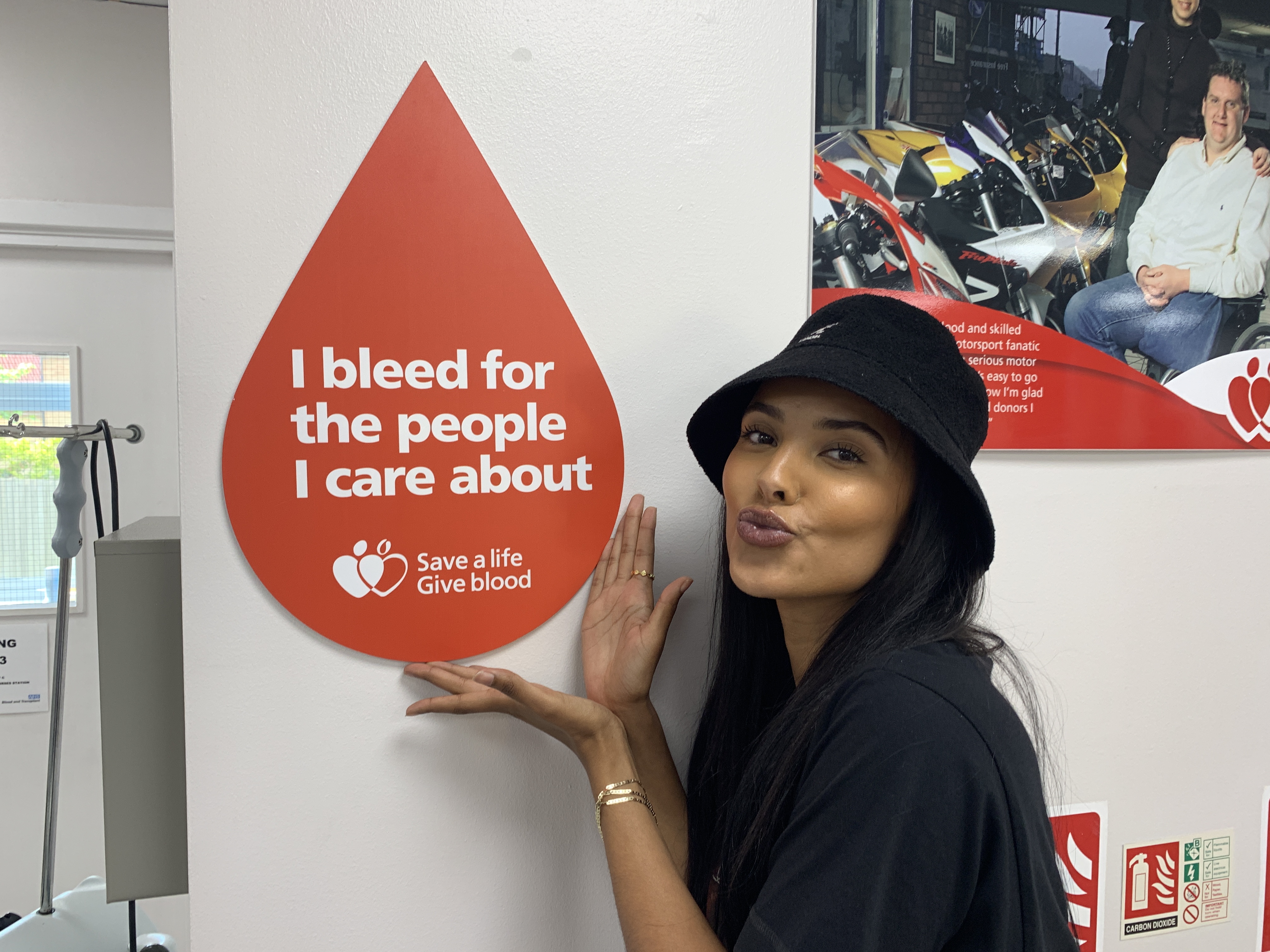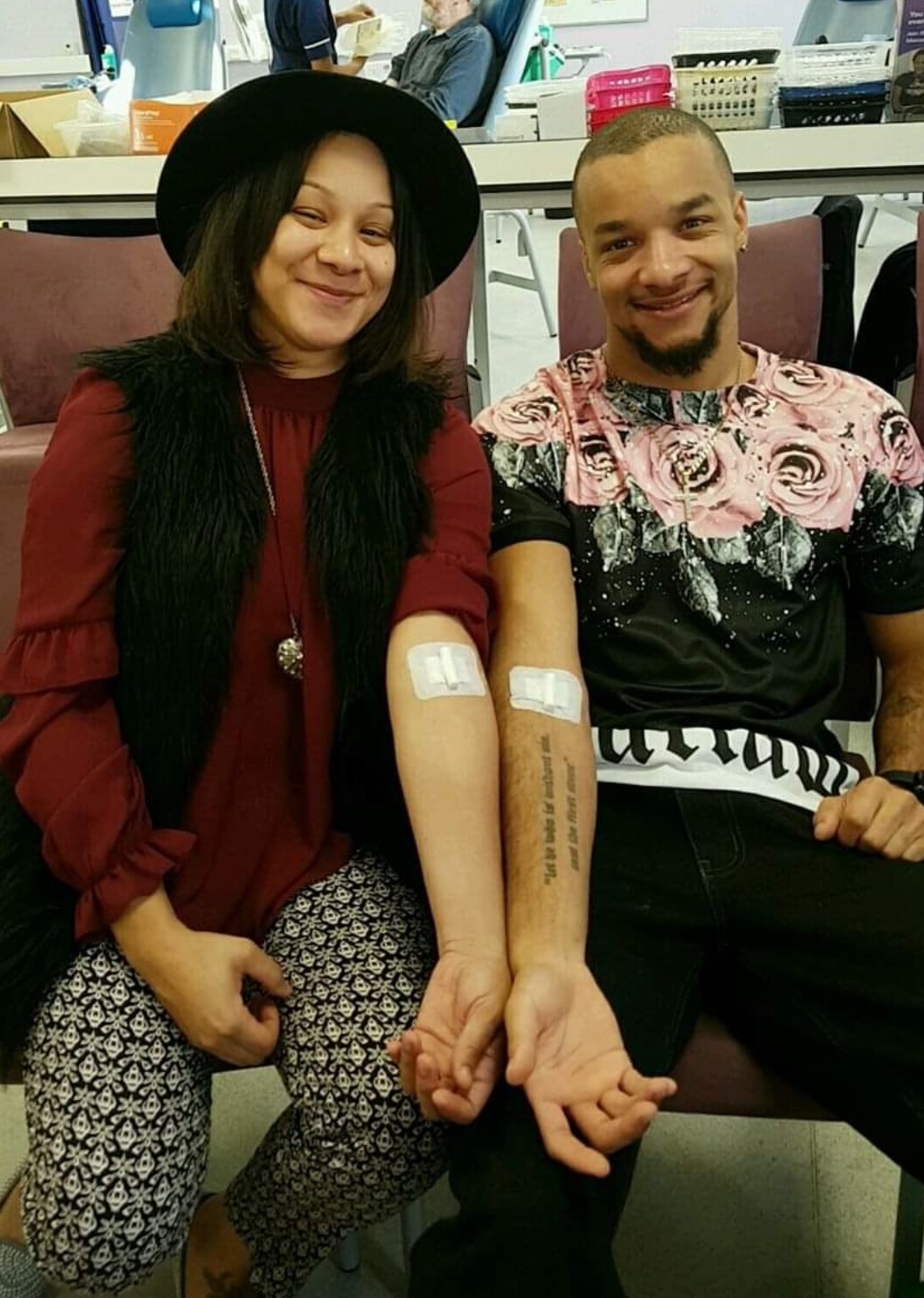Blood types in the fastest growing demand revealed
This National Blood Week (10 - 16 June), NHS Blood and Transplant (NHSBT) has revealed the donors with the blood types in the fastest growing demand in England.
Donors with the Ro Kell negative types are now the most sought after in the country, after an 50% rise in demand since 2015/16, new figures show. (1) NHSBT is now urgently appealing for more people with these types to become donors. (2)
The shortage of donors with the Ro Kell negative types means NHSBT can only supply the requested blood around half of the time.
The shortfall is made up with substitutions of the ‘universal donor’ type O negative, but this is putting growing pressure on stocks of this blood type, which is especially important for trauma patients. Last year NHSBT needed to make several urgent appeals for O negative.
DJ Maya Jama donated blood for the first time for a blood donation campaign video, which is being released on Saturday, 15 June to support National Blood Week.
She was then found to have the rare Ro Kell negative combination of types which make her one of the most in demand blood donors in the country.
Maya said: “I had no idea when I gave blood that I had an unusual blood type - Ro Kell negative donors are apparently the most sought after in the country – so it was great to know that my donation could prove life-changing for somebody.
“Donating was so much easier than I thought and I would strongly encourage others to do the same.”
People with Ro Kell negative blood are being urged to talk to family members about donation, because they may also share this rare combination of types.
NHSBT is also launching a special service for donors with this blood group to help retain and recruit donors because of how critical their types have become to patient care. Donors will have a dedicated phone number to use.
Only around 2% of donors have this rare combination of two blood types. Donors of any ethnicity can be Ro Kell negative although people of black heritage are 10 times more likely to have the Ro subtype than white people.
Ro Kell negative blood is especially important for treating the rare, inherited condition sickle cell disease. (3)
More and more patients with sickle cell disease are being put on regular full body blood transfusions, known as red cell exchanges.
Previously, many patients received intermittent ‘top ups’ but many more patients are now recognised as benefitting from regular red cell changes, which uses much more blood. (4)
John James OBE, Chief Executive of the Sickle Cell Society, said: “Blood donation is vital in helping people living with sickle cell to live healthier and less painful lives.
“National Blood Week is a great opportunity to get new blood donors and help the public understand the important role they can play in supporting the sickle cell community.”
Meshach Snape (pictured with his sister) is an A positive, Ro Kell negative donor, who has donated 16 times – his blood will be used to treat people with sickle cell disease.
Meshach, from King’s Heath in Birmingham was inspired to donate by his older sister, who is also a regular blood donor.
The 27-year-old, who is an IT telecomms engineer for the NHS, said: “I just want to help people in any way that I can.
“I was never really worried about donating because I knew what it was like from my sister.
“A lot of people are scared of needles but you just feel a pinch and that’s it. I feel more pain when I pull the tape off and it pulls the hairs out of my arm!
“You get to sit down and have a hot drink and snacks, as long as you don’t try and rush out you are okay.”
Meshach, a dad of two, who enjoys playing football, said: “I know my blood type is very helpful for people with sickle cell disease.
“I feel really good after I donate, especially when you get the text message to say which hospital your blood has gone to. I feel really proud.”
NHS Blood and Transplant particularly needs the new donors at its 23 permanent donor centres in towns and cities – these are bright, big modern venues, purpose designed for donation and created close to areas with target population groups.
Mike Stredder, Director of Blood Donation for NHS Blood and Transplant, said: “Ro Kell negative blood is vital, it used to treat people who need life-long transfusions to live longer, healthy lives. It is lifesaving.
“Blood donation is quick, easy and safe. We urgently need more Ro Kell negative donors to cope with the growing demand and the pressure on O negative stocks – we urge anyone with these groups to talk to friends and family about donation.”
During National Blood Week, NHSBT is asking people to share their stories of blood donation and transfusion to stop people taking blood for granted. Whether you’ve given or received blood please share your story for National Blood Week #MyBloodStory #GiveBlood
Become a blood donor. Register today and book and appointment at blood.co.uk or call 0300 123 23 23
Press release notes
(1) In 2015/16 hospital demand was for 40,054 single donation equivalents of Ro Kell Negative blood. By 2018/19, this had risen to 60,189.
(2) Ro and Kell refers to two different blood systems. Ro is a subtype found in RhD positive donors. Kell negative means the donor does not have the Kell protein. Kell is the third most significant blood system, after ABO and Rh. NHS Blood and Transplant aims to recruit around 4,700 Ro and Kell negative donors over next 12 months although that will still not meet demand.
(3) Sickle cell is a serious genetic disease affecting the red blood cells, which carry oxygen around the body. The patient’s blood cells form into a sickle or crescent shape and they can get stuck in blood vessels, leading to acute episodes of extreme pain. Severe sickle cell disease can cause loss of sight, organ failure and stroke, and the complications can be fatal.
(4) Patients with sickle cell anaemia are more likely to need Ro Kell negative blood because sickle cell anaemia and Ro blood are both more common in black people, so patients with sickle cell disease are more likely to have Ro blood.
Notes to editors
NHS Blood and Transplant is a joint England and Wales Special Health Authority. We provide the blood donation service for England and the organ donation service for the UK. We also provide donated tissues, stem cells and cord blood. We are an essential part of the NHS, saving and improving lives through public donation.
It is quick and easy to book an appointment to give blood. Call 0300 123 23 23 or visit blood.co.uk
NHS Blood and Transplant needs to collect 1.4 million units of blood each year to meet the needs of patients across England.
There are four main blood groups – O, A, B and AB. O negative (the universal blood group) and B negative are particularly vulnerable to shortfalls. So, we want people with those blood groups to donate as regularly as they can.
The overall demand for blood is falling by 3-4% per year due to improvements in clinical practice and our work with hospitals to ensure blood is used appropriately for patients.
We need 135,000 new blood donors each year to replace those who stop donating and to ensure we have the right mix of blood groups to match patient needs in the future
We urgently need more black donors as they are more likely to have the blood type needed to treat the increasing number of patients suffering from sickle cell disease.
System.Web.HttpException (0x80004005): Error executing child request for handler 'System.Web.Mvc.HttpHandlerUtil+ServerExecuteHttpHandlerAsyncWrapper'. ---> System.NullReferenceException: Object reference not set to an instance of an object. at ASP._Page_Views_Blocks_SharedContentBlock_SharedContentBottomBlock_cshtml.Execute() in C:\home\site\wwwroot\Views\Blocks\SharedContentBlock\SharedContentBottomBlock.cshtml:line 10 at System.Web.WebPages.WebPageBase.ExecutePageHierarchy() at System.Web.Mvc.WebViewPage.ExecutePageHierarchy() at System.Web.WebPages.WebPageBase.ExecutePageHierarchy(WebPageContext pageContext, TextWriter writer, WebPageRenderingBase startPage) at Umbraco.Core.Profiling.ProfilingView.Render(ViewContext viewContext, TextWriter writer) at System.Web.Mvc.ViewResultBase.ExecuteResult(ControllerContext context) at System.Web.Mvc.ControllerActionInvoker.InvokeActionResultFilterRecursive(IList`1 filters, Int32 filterIndex, ResultExecutingContext preContext, ControllerContext controllerContext, ActionResult actionResult) at System.Web.Mvc.ControllerActionInvoker.InvokeActionResultFilterRecursive(IList`1 filters, Int32 filterIndex, ResultExecutingContext preContext, ControllerContext controllerContext, ActionResult actionResult) at System.Web.Mvc.ControllerActionInvoker.InvokeActionResultFilterRecursive(IList`1 filters, Int32 filterIndex, ResultExecutingContext preContext, ControllerContext controllerContext, ActionResult actionResult) at System.Web.Mvc.ControllerActionInvoker.InvokeActionResultFilterRecursive(IList`1 filters, Int32 filterIndex, ResultExecutingContext preContext, ControllerContext controllerContext, ActionResult actionResult) at System.Web.Mvc.ControllerActionInvoker.InvokeActionResultFilterRecursive(IList`1 filters, Int32 filterIndex, ResultExecutingContext preContext, ControllerContext controllerContext, ActionResult actionResult) at System.Web.Mvc.ControllerActionInvoker.InvokeActionResultFilterRecursive(IList`1 filters, Int32 filterIndex, ResultExecutingContext preContext, ControllerContext controllerContext, ActionResult actionResult) at System.Web.Mvc.ControllerActionInvoker.InvokeActionResultWithFilters(ControllerContext controllerContext, IList`1 filters, ActionResult actionResult) at System.Web.Mvc.Async.AsyncControllerActionInvoker.<>c__DisplayClass21.<BeginInvokeAction>b__1e(IAsyncResult asyncResult) at System.Web.Mvc.Async.AsyncControllerActionInvoker.EndInvokeAction(IAsyncResult asyncResult) at System.Web.Mvc.Controller.<BeginExecuteCore>b__1d(IAsyncResult asyncResult, ExecuteCoreState innerState) at System.Web.Mvc.Async.AsyncResultWrapper.WrappedAsyncVoid`1.CallEndDelegate(IAsyncResult asyncResult) at System.Web.Mvc.Async.AsyncResultWrapper.End(IAsyncResult asyncResult, Object tag) at System.Web.Mvc.Controller.EndExecuteCore(IAsyncResult asyncResult) at System.Web.Mvc.Async.AsyncResultWrapper.WrappedAsyncVoid`1.CallEndDelegate(IAsyncResult asyncResult) at System.Web.Mvc.Async.AsyncResultWrapper.End(IAsyncResult asyncResult, Object tag) at System.Web.Mvc.MvcHandler.<BeginProcessRequest>b__5(IAsyncResult asyncResult, ProcessRequestState innerState) at System.Web.Mvc.Async.AsyncResultWrapper.WrappedAsyncVoid`1.CallEndDelegate(IAsyncResult asyncResult) at System.Web.Mvc.Async.AsyncResultWrapper.End(IAsyncResult asyncResult, Object tag) at System.Web.Mvc.HttpHandlerUtil.ServerExecuteHttpHandlerWrapper.<>c__DisplayClass4.<Wrap>b__3() at System.Web.Mvc.HttpHandlerUtil.ServerExecuteHttpHandlerWrapper.Wrap[TResult](Func`1 func) at System.Web.HttpServerUtility.ExecuteInternal(IHttpHandler handler, TextWriter writer, Boolean preserveForm, Boolean setPreviousPage, VirtualPath path, VirtualPath filePath, String physPath, Exception error, String queryStringOverride) at System.Web.HttpServerUtility.ExecuteInternal(IHttpHandler handler, TextWriter writer, Boolean preserveForm, Boolean setPreviousPage, VirtualPath path, VirtualPath filePath, String physPath, Exception error, String queryStringOverride) at System.Web.HttpServerUtility.Execute(IHttpHandler handler, TextWriter writer, Boolean preserveForm, Boolean setPreviousPage) at System.Web.HttpServerUtility.Execute(IHttpHandler handler, TextWriter writer, Boolean preserveForm) at System.Web.Mvc.Html.ChildActionExtensions.ActionHelper(HtmlHelper htmlHelper, String actionName, String controllerName, RouteValueDictionary routeValues, TextWriter textWriter) at System.Web.Mvc.Html.ChildActionExtensions.RenderAction(HtmlHelper htmlHelper, String actionName, String controllerName, RouteValueDictionary routeValues) at ASP._Page_Views_Partials_Grid_Editors_DocTypeGridEditor_sharedContent_cshtml.Execute() in C:\home\site\wwwroot\Views\Partials\Grid\Editors\DocTypeGridEditor\sharedContent.cshtml:line 14 at System.Web.WebPages.WebPageBase.ExecutePageHierarchy() at System.Web.Mvc.WebViewPage.ExecutePageHierarchy() at System.Web.WebPages.WebPageBase.ExecutePageHierarchy(WebPageContext pageContext, TextWriter writer, WebPageRenderingBase startPage) at Umbraco.Core.Profiling.ProfilingView.Render(ViewContext viewContext, TextWriter writer) at System.Web.Mvc.Html.PartialExtensions.Partial(HtmlHelper htmlHelper, String partialViewName, Object model, ViewDataDictionary viewData) at ASP._Page_app_plugins_doctypegrideditor_render_doctypegrideditor_cshtml.Execute() in C:\home\site\wwwroot\app_plugins\doctypegrideditor\render\doctypegrideditor.cshtml:line 28 at System.Web.WebPages.WebPageBase.ExecutePageHierarchy() at System.Web.Mvc.WebViewPage.ExecutePageHierarchy() at System.Web.WebPages.WebPageBase.ExecutePageHierarchy(WebPageContext pageContext, TextWriter writer, WebPageRenderingBase startPage) at Umbraco.Core.Profiling.ProfilingView.Render(ViewContext viewContext, TextWriter writer) at System.Web.Mvc.Html.PartialExtensions.Partial(HtmlHelper htmlHelper, String partialViewName, Object model, ViewDataDictionary viewData) at ASP._Page_Views_Partials_grid_editors_base_cshtml.Execute() in C:\home\site\wwwroot\Views\Partials\grid\editors\base.cshtml:line 19
Media enquiries
Stephen Bailey - 0151 268 7017 or stephen.bailey@nhsbt.nhs.uk
Press office - 01923 367 600 or email pressoffice@nhsbt.nhs.uk
For urgent out of hours enquiries please call 0117 969 2444
